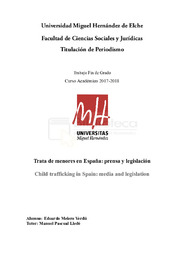Resumen :
Los delitos contra menores son un tema considerado 'difícil' o 'tabú' en nuestra sociedad
actual. Resulta duro pensar que una persona pueda ejercer algún tipo de violencia contra
otra que no puede defenderse por sí misma.
Esto, sin embargo, es una realidad existente en todas las naciones, incluyendo España.
Precisamente, nuestro país -por sus circunstancias históricas- tiene una trayectoria
interesante en el abuso y la defensa de menores, que incluso es un punto de controversia
hoy en día.
La trata de menores entra en estos asuntos controvertidos y tabús, más aún cuando la
trata de adultos ya crea rechazo de por sí.
Al leer el título de este trabajo puede surgir rápidamente la pregunta: ¿existe realmente
la trata de menores en España? Debatir su existencia, o no existencia es precisamente
uno de los objetivos principales del siguiente trabajo.
Y ligadas a esta pregunta surgen otras más: ¿existen acciones del Gobierno español
contra la trata? ¿Y por parte de Europa? ¿Cómo es vista la trata de menores desde
fuera? Pero, sin duda, desde el punto de vista de la especialidad periodística, la mayor
pregunta es: ¿Qué hacemos con estas informaciones?
La prensa, que está tan estrechamente relacionada con la sociedad, es la primera que se
ha de hacer eco de este delito, que ha de 'preocuparse' por la trata de menores. Debido a
ello, se puede decir que el trabajo que se presentará a continuación tiene dos grandes
bloques que se repiten durante todas sus partes: uno enfocada en la sociedad, y otro en
el periodismo.
Todo estos puntos, y varios más, son los que serán tratados en este trabajo con la idea
final de aportar luz sobre un delito que es tan poco conocido como dañino para sus
víctimas.
2
Criminal offense against minors is a subject perceived as 'difficult' or 'taboo' in our
actual society. Thinking that someone can exert any kind of violence on a person that
can't defend themselves can be quite harsh.
However, this reality is an existing one in every nation of the world, including Spain.
Precisely, -by virtue of its historical circumstances-, Spain has an interesting story with
the abuse and defense of minors, and as such, this is a controversial subject nowadays.
Child trafficking is one of these taboo, controversial themes, even more having in
consideration that adult trafficking already creates repulse by itself.
By reading the title of this essay, one could easily raise the question: does child
trafficking really exist in Spain? Debating its existence, or nonexistence, is precisely
one of the main aims of this essay.
And with this question come several others: do actions against trafficking on behalf of
the Spanish government exist? And on behalf of Europe? How is child trafficking seen
from the outside? But, from the point of view of journalism, the first and foremost
question is: What do we do with this informations?
The press, so tightly related to society, is the first entity that must pick up on this crime,
that must 'worry about' child trafficking. That's why it could be argued that the
following essay has two big thematic blocks that repeat all over its different parts: one
centered on society, and another one centered on journalism.
All of these themes, and several more, will be examined in this essay with the final
purpouse of shedding light on a crime that is as unknown as is harmful for its victims.
|
 La licencia se describe como: Atribución-NonComercial-NoDerivada 4.0 Internacional.
La licencia se describe como: Atribución-NonComercial-NoDerivada 4.0 Internacional.
.png)
